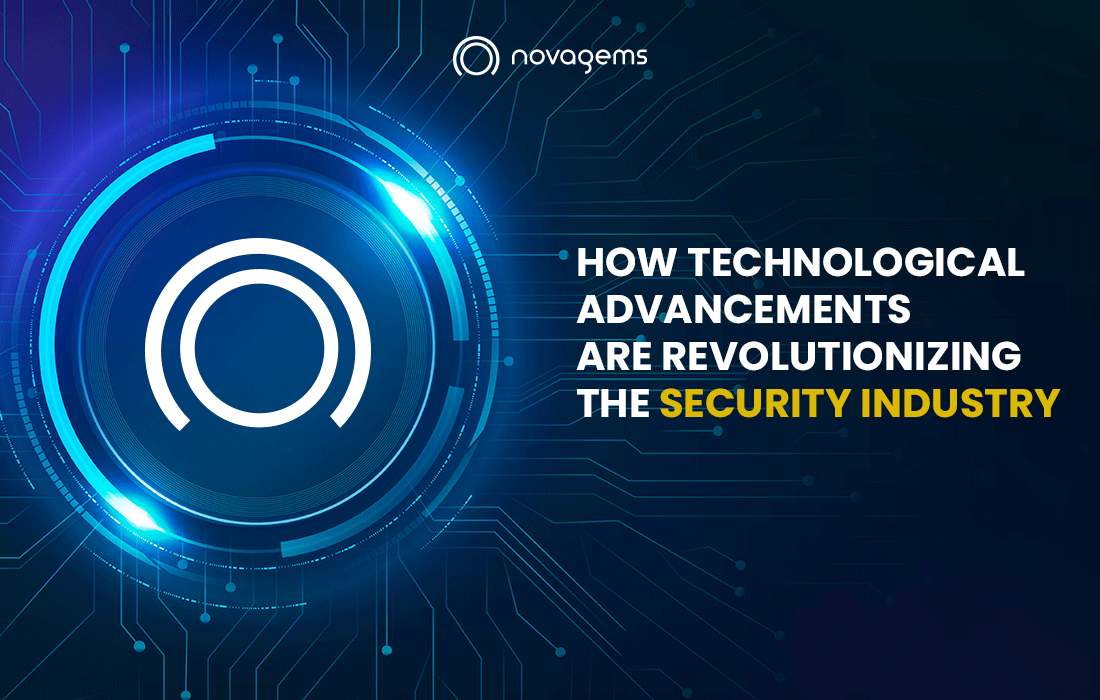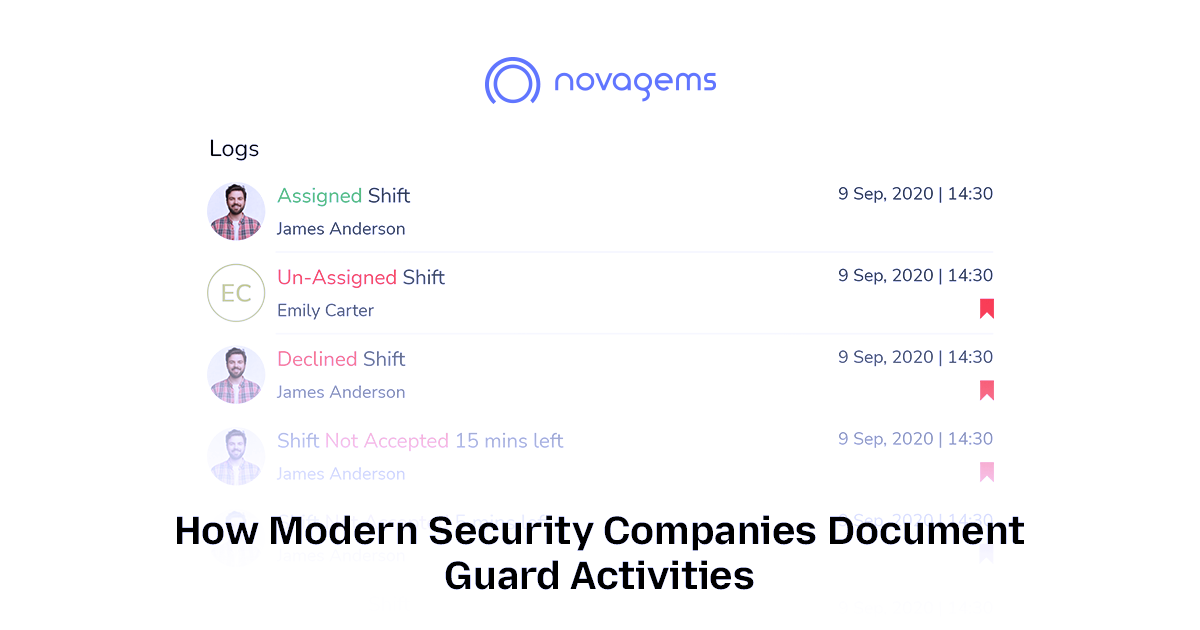How Technological Advancements Are Revolutionizing The Security Industry
Published on: Fri, Jun 3, 2022
Read in 13 minutes

Key Takeaways
- Technological advancements are reshaping how private security operates today.
- Real-time security solutions are replacing manual, reactive systems.
- Tools like AI surveillance, cloud monitoring, and mobile guard apps are now must-haves.
- The future of the private security industry is defined by automation, integration, and data-driven decisions.
Why the Security Industry is Evolving Rapidly
The private security industry, once reliant on human observation and traditional methods, is undergoing a massive shift. Thanks to rapid technological advancements, we’re now entering an era where real-time security, automation, and AI-driven analytics are taking center stage. These tools aren’t just modern luxuries, they’re necessities for companies looking to stay ahead of threats, streamline operations, and meet evolving client expectations.
The technological advancements in security industry are not only improving response times and accuracy but also helping companies reduce costs, improve compliance, and offer more value-added services to clients.
Numerous security companies are open to the idea of using technology to their advantage and drive better results. These businesses are using technology to enhance their performance in many ways. Some of these ways include better management of their workforce, facilitating better integration and collaboration, and sufficing the unique requirements of their clients.
Technological Integration In The Security Industry
Modern technology in the security industry has brought a revolution by making things much easier for security companies and managers.
Security businesses needed these technological competencies to get a competitive edge over others. Customer satisfaction also influences the success of a security company. While it has always been a challenge for such businesses, technology certainly made it easy.
As a result, it fueled the demand for security guard management solutions. These solutions leverage the capabilities of advanced technologies such as artificial intelligence, predictive analytics, machine learning, and more. Using such advanced technologies allowed security guard businesses to manage the guards in a better way and boost customer satisfaction.
From recruitment to training the guards and conducting regular performance reviews, the security managers can easily manage everything through a security guard management system.
Better Workforce Management Using Technology As A Tool
Technological advancements have transformed the way security companies manage their workforce. As a result, companies are now focusing their efforts on recruiting employees comfortable with modern technology. Additionally, the automation capabilities brought in by advanced solutions, like workforce management systems, fuel the transformation from manual process management to automation.
The guard workforce management solutions have helped security companies in many ways. We have discussed some of the benefits of such systems below:
-
Guard Monitoring
If we look a few years back, we can tell a security manager could never monitor all the guards simultaneously. However, it changed after the advent of advanced security guard management solutions. The monitoring capabilities offered by the system through GPS tracking, attendance, and real-time communication, help managers in many ways. They allow them to measure and track every security guard under their command. When security companies carefully monitor their guards, it helps them achieve accountability and customer satisfaction.
-
Regular Scheduling
Better workforce management is never possible without the capability to assign regular work schedules to employees. However, manual scheduling has always been a big concern for security companies as it drains a lot of energy and resources. Thanks to solutions like a security guard management system, such issues are no longer a hassle for security businesses. The scheduling capabilities of these solutions allow managers to create the ideal schedule for their workforce. The employees can then view the work schedules and adhere to them without hassle. The managers can use templates and tweak the guard schedules for daily, weekly, and even monthly work assignments.
-
Reporting And Incident Management
Communication and collaboration are crucial to facilitate effective and robust security for the clients. The security guard management systems come with capabilities that allow the real-time transfer of information. The features like Incident Reporting, Smart Response, and panic buttons help save the day for the guards and managers. So, security guards can now report incidents to their supervisors in real-time and seek an instant action plan during emergencies.
-
Performance Assessment
Every business needs to maintain the record of its workforce and monitor its performance to ensure efficacy. A guard management system has made it very easy for the managers or supervisors. The system records and stores all the information associated with the employees in its database. Thus, the managers can seamlessly access the information and evaluate the performance of every employee to ensure unmatched efficacy. It helps them carry out tasks like performance analysis, payroll creation, etc.
Impact On Customer Satisfaction
Customer experience has always been crucial for security guard companies. Fortunately, technological advancements have made it much easier to ensure an unmatched level of customer satisfaction. Also, since technology has helped boost accountability among the security guards, it automatically translates to better customer satisfaction.
The security guard management systems also allow the clients to gain real-time information about the security guards. It helps improve the reliability and accountability of the security company. So, your clients can gain more trust in your services, allowing them to choose your company for all their security needs in the long run.
Rise of Real-Time Security Systems
Gone are the days when security meant watching hours of CCTV footage or manually logging events. Real-time security has revolutionized the industry.
What Is Real-Time Security?
Real-time security refers to the ability of a system to monitor, detect, and respond to events as they happen. This includes tools like:
- Live surveillance with AI analytics
- Mobile alerts for intrusions
- Real-time GPS tracking for guards
- Instant panic button responses
Benefits of Real-Time Monitoring
- Faster Incident Response: When an intrusion or breach happens, the system alerts security teams instantly.
- Proactive Threat Detection: AI can identify suspicious behavior before it escalates.
- Guard Safety: Mobile security apps now come with panic buttons, live location sharing, and automated check-ins to ensure lone worker safety.
A study by MarketsandMarkets found that the global real-time security market is projected to reach $502.1 billion by 2029. This reflects the increasing demand for systems that don’t just record but actively prevent incidents.
Security Automation Tools Are the New Standard
One of the most impactful changes in recent years has been the adoption of security automation tools. These tools reduce the manual burden on guards and administrators, while improving consistency and compliance.
Common Security Automation Tools
- Automated shift scheduling and timesheets
- Guard tour tracking apps with auto-logging
- AI-powered video analytics
- License plate recognition and smart access control
- Automated incident reporting and escalation systems
Why Security Automation Matters
- Eliminates Human Error: No missed checkpoints, forgotten reports, or miscommunications.
- Improves Accountability: Every action is logged and time-stamped, making audit trails easy.
- Saves Time and Resources: Admin tasks like reporting, scheduling, and tracking can be automated with minimal oversight.
- Boosts Guard Productivity: Less paperwork = more focus on the job.
AI and Machine Learning in Surveillance
Artificial Intelligence (AI) is changing how surveillance works.
Instead of relying on human guards to spot suspicious activity on screens, AI can:
- Analyze thousands of video frames per second
- Detect loitering, perimeter breaches, and unusual behavior
- Automatically alert security personnel in real time
Real Use Cases of AI Surveillance
- Retail: Preventing shoplifting by identifying suspicious customer movement
- Industrial Facilities: Monitoring restricted zones
- Airports: Facial recognition to flag persons of interest
AI doesn’t sleep, get distracted, or miss anything, and that makes it a game-changer for modern security teams.
Cloud-Based Security Systems
Traditional on-premise security systems are expensive and hard to scale. Cloud-based solutions are now leading the charge.
What Is a Cloud-Based Security System?
It refers to security infrastructure (cameras, access control, software) that stores data on cloud servers instead of local hardware. Users can manage systems remotely via web or mobile platforms.
Benefits of Cloud Security Tools
- Remote Access: Admins can monitor systems from anywhere
- Scalability: Add new locations or cameras without huge infrastructure costs
- Cost Savings: Lower upfront investment, no maintenance of on-prem servers
- Disaster Recovery: Cloud backups protect data in case of hardware failure
In 2025, nearly 60% of new security installations are cloud-native, especially among small to mid-sized companies looking for agility and flexibility.
Mobile Technology for Guard Management
Smartphones have become powerful tools in the hands of security professionals.
Mobile Guard Apps Now Offer:
- Clock-in/clock-out with geofencing
- GPS tracking of tours and patrols
- Instant alerts for missed checkpoints
- Daily Activity Reports (DAR) submitted from mobile
- Incident photo/video uploads in real time
With these features, guards can perform more efficiently, and supervisors get full visibility—no more paper logs or radio check-ins.
Example: Novagems’ Security Guard App
- Real-time guard monitoring
- Smart scheduling and compliance alerts
- Automated reporting and analytics
Such solutions reflect how mobile tech is at the heart of the future of private security industry.
Internet of Things (IoT) & Smart Devices
The Internet of Things (IoT) refers to a network of connected devices that share data in real time.
In security, this includes:
- Smart locks and door sensors
- Motion detectors and environmental sensors
- Smart CCTV cameras
- Connected alarms and smoke detectors
How IoT Improves Security
- Instant Threat Alerts: If a door is forced open or a sensor is triggered, alerts go out immediately.
- Centralized Monitoring: Multiple IoT devices sync into one dashboard.
- Energy Efficiency: Devices can power down or adjust settings automatically.
- Predictive Maintenance: Get notified before a camera or sensor fails.
As smart cities evolve, the integration of IoT in private security operations becomes not just important, but essential.
The Future of the Private Security Industry
Looking ahead, the future of private security industry is defined by four key trends:
1. Predictive Security
Instead of reacting to incidents, AI systems will analyze patterns and predict risks—before they occur.
2. Integration of Cyber and Physical Security
With rising data breaches, security firms are merging physical and IT security to offer holistic protection.
3. Autonomous Security Systems
Drones, robots, and automated patrols will augment human security teams, especially in large or hazardous areas.
4. Personalized Security Solutions
Clients will expect tailored solutions using AI, behavior analysis, and customizable alerting systems.
By 2030, the private security industry will likely shift from labor-intensive models to technology-first service providers offering end-to-end risk management.
Challenges to Consider
While the technological advancements in the security industry offer tremendous opportunities, they also come with certain challenges that companies must navigate to ensure smooth and responsible adoption.
1. Data Privacy & Regulatory Compliance
Advanced technologies like facial recognition, biometric access control, and AI surveillance involve the collection of sensitive personal data. With increasing global concerns about privacy, governments are tightening regulations around how data can be collected, stored, and used. For example:
- The EU has introduced the AI Act to govern AI usage.
- Countries like Canada and India are rolling out stricter data privacy laws.
Security companies must ensure they follow data protection regulations such as GDPR, PIPEDA, or local compliance norms, or risk facing legal action and loss of customer trust.
2. Cybersecurity Risks in Connected Systems
The rise of cloud-based platforms, IoT devices, and mobile apps introduces new cybersecurity vulnerabilities. A compromised system can lead to:
- Unauthorized access to camera feeds
- Data leaks of sensitive security logs
- Manipulation of real-time alerts and schedules
Security firms must now think like cybersecurity companies, implementing firewalls, end-to-end encryption, and two-factor authentication to protect both their operations and client data.
3. Lack of Technical Expertise Among Staff
Many traditional security personnel come from backgrounds where digital tools weren’t the norm. Introducing AI-based tools, cloud platforms, or mobile apps without proper training can lead to misuse, underutilization, or resistance.
Companies must invest in ongoing training and upskilling to ensure that guards and supervisors are confident using new systems. A guard who doesn’t understand how to log reports on an app or respond to sensor alerts may create more problems than solutions.
4. High Upfront Investment for Small Firms
While automation tools and AI systems promise ROI in the long run, the initial setup cost can be a barrier, especially for smaller firms. Expenses may include:
- Subscription fees for cloud platforms
- Hardware for smart devices and sensors
- Mobile devices or wearables for guards
- Staff training costs
That’s why it’s critical to choose scalable tools that allow companies to start small and grow gradually, rather than going all-in at once.
5. Integration & Compatibility Issues
Security teams often rely on a mix of old and new systems. Integrating legacy CCTV setups, access control systems, and modern cloud platforms can cause compatibility issues, delays, or failures.
Companies need to plan technology adoption in phases, choosing platforms that support APIs and are interoperable with existing tools. Failing to do so can result in fragmented data and operational gaps.
How to Future-Proof Your Security Company
In a rapidly evolving industry, the companies that will survive and thrive are those that embrace innovation in a strategic, scalable way. Here’s how you can future-proof your private security business while keeping things efficient, secure, and client-focused.
1. Start with What You Can Automate Today
You don’t need to overhaul your entire operations overnight. Begin with small wins:
- Use a security workforce management software like Novagems to digitize shift scheduling and timesheets.
- Replace manual incident logs with automated DAR reports via a mobile app.
- Enable real-time notifications for missed checkpoints or panic button alerts.
These simple automation tools immediately boost accountability and reduce paperwork.
2. Invest in Real-Time Security Capabilities
Make sure your company can respond to threats as they happen—not after the fact. This means:
- Upgrading to smart cameras with live alerting
- Equipping guards with mobile patrol apps
- Adding GPS tracking for field officers
Real-time security isn’t just a trend—it’s becoming a standard that clients expect.
3. Upskill Your Team Regularly
Technology is only effective if your staff knows how to use it. Offer:
- Hands-on training for mobile apps and dashboards
- Workshops on using AI surveillance tools
- Digital literacy programs for senior guards
Don’t just train once—make it part of your ongoing strategy. Consider adding a tech mentor or champion within your team to support others and drive adoption.
4. Choose Scalable & Interoperable Tools
As you grow, your tools should grow with you. Look for:
- Cloud-based systems that support unlimited users and locations
- Platforms with API integrations for third-party software (like payroll, access control, etc.)
- Subscription-based models that don’t require massive upfront hardware purchases
This allows you to expand gradually without redoing your entire setup.
5. Build a Security Ecosystem, Not Just a Service
Modern clients don’t just want guards—they want end-to-end protection. Offer bundled services:
- Real-time monitoring + incident reporting
- Access control + visitor logs
- Scheduled patrols + emergency response dashboards
By offering a tech-enabled service package, you differentiate yourself from legacy competitors and open new revenue streams.
6. Stay Ahead by Following Industry Trends
Set up alerts, subscribe to trade publications, and attend expos. Follow:
- Regulatory updates (e.g., AI laws, privacy regulations)
- Product launches in security tech
- Benchmark reports from industry leaders (e.g., IFSEC, TechRadar)
Being informed allows you to anticipate change, rather than react to it.
7. Focus on Client Education
Clients may not understand the value of your technology unless you explain it clearly. Use:
- Demos and walkthrough videos
- Client newsletters showing tech benefits
- Reports with visual analytics
Show them how your tools help them save money, reduce liability, and get better protection.
With the points above, we saw how technological advancements have been playing a crucial role in the betterment of security companies. Because of these benefits, more and more security companies are turning to technology to drive better results.
If you are a security manager who wants to integrate a high-tech solution into your security company, contact Novagems. We provide advanced security guard management solutions with multifaceted benefits. Learn how our system can help you achieve better results by booking a demo today!
Get a Free Trial
Sign up For Newsletter
Latest Blog Posts
Get Started
Start being productive & grow your business
with Novagems





